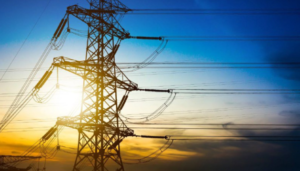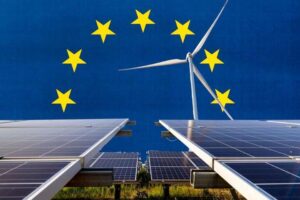
In October 2025, Ukraine imported 353.9 thousand MWh of electricity, which is 2.5 times more than in September, according to the DIXI Group analytical center, citing data from Energy Map.
“This is the highest monthly import figure since the beginning of the year. At the same time, exports fell sevenfold to 90.8 thousand MWh, which was the first decline in the last five months,” the center reported.
According to DIXI Group, the sharp increase in imports is due to the deterioration of the situation in the energy system caused by massive shelling of energy infrastructure. In particular, during October, Russian attacks damaged, among other things, thermal and hydroelectric power facilities, which led to a power shortage. As a result, emergency and scheduled hourly power cuts for the population were resumed, as well as restrictions on consumption for industry and business.
The situation was exacerbated by a drop in temperature. Low output from residential solar power plants due to cloudy weather, as well as the active use of electric heaters before the start of the heating season, placed an additional burden on the power system.
Electricity imports in October were wave-like in nature, due to enemy shelling. In particular, after a massive strike on October 10, external supplies rose sharply – on October 11, imports reached 19.0 thousand MWh, which is 141.5% more than the previous day.
A similar situation repeated itself after the attack on October 22: on October 23-24, there was a sharp increase in imports to 19.8 thousand MWh and 23.4 thousand MWh, respectively, or +64.8% and +94.4% compared to October 22. At the end of the month, after another large-scale attack on October 30, Ukraine was again forced to increase external purchases: on October 31, imports amounted to 22.4 thousand MWh (+76.9% compared to the previous day).
In the structure of imports by direction of electricity supply, Hungary accounts for more than 50% – 180.0 thousand MWh (50.9%). This is followed by Poland with 80.2 thousand MWh (22.7%) and Romania with 76.9 thousand MWh (21.7%).
The maximum agreed commercial capacity for imports from the EU from December 2024 is 2.1 GW. On average, in October 2025, capacity utilization was 22.6%, with a maximum on October 18 between 20:00 and 21:00 (84.4%) and the only hour of the month when no electricity was imported (October 3 between 22:00 and 23:00). At the same time, during peak morning and evening consumption hours, capacity utilization increases significantly.
In addition to the commercial capacity of 2.1 GW for Ukraine, an additional 0.25 GW of emergency assistance is available from neighboring ENTSO-E operators as “insurance” at critical moments. Thus, emergency assistance was provided during October from Poland, both in the form of additional electricity with a total volume of 28.8 thousand MWh and in the form of supplies of surplus electricity to Poland (5.25 thousand MWh). There is no public information available on other neighbouring power systems.
In turn, the main volumes of electricity exports in October were carried out during hours of minimum domestic consumption – mainly at night and early in the morning – from 0:00 to 6:00.
In terms of export structure by destination, Hungary prevails with 39.3 thousand MWh (43.2%), Moldova with 31.1 thousand MWh (34.3%), and Romania with 14.9 thousand MWh (16.4%).
“As a result, imports in October exceeded exports by almost four times – the negative balance in October amounted to 263.0 thousand MWh,” DIXI Group concluded.
Overall, based on the results of the first 10 months of 2025, Ukraine is a net importer of electricity, with a negative balance of 168.7 thousand MWh for this period.

EU countries could save EUR250 billion annually by 2040 by accelerating the transition to electricity, according to a press release from France’s Schneider Electric.
“The so-called ‘energy trinity’ – the balance between affordability, security, and sustainability – remains a challenge, as high dependence on fossil fuel imports keeps prices high and delays the achievement of climate goals,” the company said.
According to a press release based on Schneider Electric’s report “Europe’s Energy Security and Competitiveness – Accelerating Electrification,” the current level of electrification in Europe is only 21% — a figure that has remained unchanged over the past decade and is 10% lower than in China, where rapid electrification is taking place. At the same time, the cost of energy for domestic consumers in the EU is EUR0.27 per kWh, in the US — EUR0.15/kWh, and in China — EUR0.08/kWh.
“This means that daily energy consumption for each EU citizen is three times more expensive than for Chinese residents,” the report’s authors concluded.
According to the document, the pace and level of electrification in different European countries vary significantly due to differences in infrastructure, policy, market maturity, and consumer behavior. In particular, some countries, such as the Scandinavian countries, have made significant progress in the electrification of transport and buildings, while others are only beginning to scale up their efforts. At the same time, Southern Europe shows higher rates of building electrification, while Western and Central Europe focus on industrial electrification and the development of prosumer initiatives.
“To remain competitive on the world stage, Europe needs to accelerate the transition to a more electrified economy,” according to Schneider Electric analysts.
The report identifies several key policy areas that need to be implemented to achieve this goal.
First and foremost, according to the authors of the document, governments need to reduce the price difference between electricity and natural gas by gradually phasing out fossil fuel subsidies and reforming the tax system to encourage the use of clean energy.
Equally important is accelerating financing — simplifying access to investment, introducing targeted incentives, especially for small and medium-sized businesses, and directing revenues from emissions trading and innovation funds to electrification projects.
The report also highlights the need to develop local markets, which involves mandatory electrification of new buildings and industrial processes, support for the rapid introduction of heat pumps and electric vehicles, and encouragement of prosumer initiatives.
In addition, an important direction is to promote local development through sustainable public procurement, accelerate standardization, and support European innovation and manufacturing—this will allow the economic and social benefits of electrification to be fully realized across the continent.
“This study is one of the most thorough analyses of Europe’s electrification potential and the policy actions needed to realise it. It emphasizes that electrification is vital — not only for achieving climate goals, but also for stimulating economic growth, energy independence, and industrial competitiveness,” said Laurent Bataille, Executive Vice President of Schneider Electric in Europe.
In his opinion, Europe must urgently overcome the stagnation of electrification, for which the relevant technologies already exist and are ready for implementation. At the same time, appropriate policy incentives and decisive business action are also needed to unlock the economic and environmental potential that EU countries need.

Associations of mining and metallurgical, other industrial and extractive enterprises, manufacturers of building materials and cement have spoken out against increases in freight and electricity tariffs due to the risk of enterprises shutting down or a significant drop in production.
They made this statement at a press conference at the Interfax-Ukraine agency on Tuesday on the topic of “The tariff policy of state monopolies – JSC Ukrzaliznytsia and NEC Ukrenergo, their negative impact on industry and the economy of Ukraine.”
Alexander Kalenkov, president of the Ukrmetallurgprom association of enterprises, noted that the consumers of the services of so-called natural monopolies are mining and metallurgical companies, cement producers, building materials manufacturers, and the like.
“These are the main customers of companies such as Ukrzaliznytsia and Ukrenergo. Before the war, the mining and metallurgical complex, together with ferroalloy plants, consumed about 60% of all electricity supplied to industry and transported more than 40% of the traffic provided by Ukrzaliznytsia. Therefore, we are dependent on the activities of these companies, just as they are dependent on us,” Kalenkov stated, expressing hope that in the future these markets will become more competitive and monopolies will be broken up. But until then, the state must ensure that these monopolies do not abuse their position, he believes.

The head of Ukrmetallurgprom emphasized that Ukraine has the highest electricity tariffs in Europe. “In practice, this means that we are losing the competitive struggle to all entrepreneurs from the EU. I am not even talking about companies located in countries that still consume Russian energy resources—there, prices are several times lower than ours, both for gas and electricity. And that is why we are losing our traditional markets,” Kalenkov stressed.
As for railway tariffs, he said that they are currently cheaper in Poland and Slovenia than in Ukraine. “We already transport cargo by Ukrzaliznytsia at a cost that is 15-20% higher than in Europe, and there are plans to increase tariffs by another 37%. This is not only economically unreasonable and unjustified, it is a dead end,” Kalenkov said.
In his opinion, the tariff policy of Ukrzaliznytsia and Ukrenergo requires attention at the level of the Cabinet of Ministers and the Verkhovna Rada. Ideally, an independent body on transport tariffs, similar to the National Energy and Utilities Regulatory Commission, should be created. To subsidize passenger transportation, UAH 26 billion should be allocated in the budget for 2026 so as not to increase freight tariffs. Otherwise, due to the increase in tariffs, our enterprises will begin to reduce production or exit the market.
Executive Director of the Ukrainian Cement Manufacturers Association (Ukrcement) Lyudmila Kripka emphasized that two-thirds of the cement produced in Ukraine, as well as the raw materials for it, are delivered by rail. Therefore, the industry is very sensitive to unjustified increases in freight tariffs.
“We have already gone down this road, such actions have already had negative consequences in the past, and this time there will be no miracles either. This will lead to negative consequences. Manufacturers will be forced to pass on the increase in tariffs to their products, that is, to the end consumer. This will reduce consumption of products and, consequently, reduce their production and transportation,” Kripka stressed.
At the same time, she pointed out the need to develop state support instruments for energy-intensive export-oriented industries as a temporary anti-crisis measure. According to her, technical and economic criteria should be introduced specifically for enterprises in priority industries. At the same time, the funds saved from the reduction in tariffs for electricity transmission and dispatching could be directed towards investment in our own renewable energy sources.

“In this way, we would fulfill the decarbonization targets set for us by the European Union,” Kripka stated.
She cited data from the state-owned company Ukrpromvneshexpertiza, according to which a 30% increase in freight tariffs would lead to a reduction in GDP of almost UAH 100 billion, a loss of foreign exchange earnings of UAH 98 billion, annual budget losses of more than UAH 36 billion, and the elimination of at least 76,000 jobs.
Sergey Kudryavtsev, executive director of the Ukrainian Association of Ferroalloy Producers (UkrFA), noted that the majority of ferroalloy enterprises are located along the shore of the Kakhovka Reservoir, i.e., in an area close to the combat zone, where working conditions are extremely difficult. In particular, manganese plants have been idle for two years.
“We cannot transport raw materials to ferroalloy plants because the railway lines have been destroyed. And we cannot pay to transport the raw materials needed for ferroalloy production by detours. Ferroalloy plants are currently operating at 15-20% of their capacity. This situation will lead to the end of ferroalloy production in Ukraine. Imported alloys will be brought to us, and the workers will be left without jobs,” Kudryavtsev said.
According to him, this frontline zone is currently being held together thanks to the Nikopol Ferroalloy Plant (NFP), Nikopol pipe and metallurgical enterprises, but it could become “gray” if people leave.
“Today, we have problems with production, logistics, staff shortages, and electricity. This is a region that used to produce electricity, but today we get it from western Ukraine. The tariff is unaffordable for us. Therefore, we are in a situation where we may have to shut down, and it will not be possible to recover. Enterprises are currently operating at 15% capacity, maintaining a continuous process. Because if you stop a ferroalloy furnace, it will take six months to start it up again,” added the executive director of UkrFA.
Source: https://www.youtube.com/live/ATmga3Sdn3g
ELECTRICITY, FREIGHT TRANSPORTATION, KUDRYAVTSEV, TARIFF, КАЛЕНКОВ, КРИПКА

The Cabinet of Ministers of Ukraine has extended the provision on imposing special obligations (SO) on electricity market participants until April 30, 2026, Prime Minister Yulia Sviridenko announced.
“Electricity prices for the population will remain unchanged this winter. The government has extended the SRO for electricity until April 30, 2026. This means that during the heating season, citizens will continue to pay UAH 4.32 per kWh,” Sviridenko wrote on Telegram following Wednesday’s government meeting.
According to her, preferential prices for consumers with electric heating will also remain in place.
Thus, for consumption of up to 2,000 kWh per month, the price will be 2.64 UAH per kWh, and for consumption above the established limit, the price will be 4.32 UAH per kWh.
“This is part of a comprehensive program to support Ukrainians in winter. We are reducing the financial pressure on families during the heating season,” the prime minister added.
As reported earlier, the Cabinet of Ministers extended the validity of the provision on imposing special obligations (SOP) on natural gas market entities for gas supplies to domestic consumers, gas distribution system operators, “last resort” suppliers, and gas-fired electricity producers from October 31, 2025, to March 31, 2026.

Ukrnafta announced which gas stations are operating without electricity and which gas stations have “unbreakable points.”
The enemy has once again intensified its attacks on the country’s energy infrastructure. The Chernihiv region has been hit the hardest, with 307,000 people left without power.
All UKRNAFTA gas stations—the largest single-brand network of gas stations in the country—continue to operate in the event of power outages. In total, there are 663 gas stations throughout Ukraine. There, you can always refuel your car with European-quality fuel.
Of these, 360 gas stations operate in “unbreakable point” mode. They are equipped with additional generators. There, people can warm up, drink hot tea or coffee, charge their phones, and access the internet.
“Massive attacks on energy infrastructure have led to power outages in a number of regions, including Chernihiv, Sumy, and others. The UKRNAFTA gas station network continues to operate even during power outages. We have provided backup power and conditions for visitors so that Ukrainians can refuel, warm up, and stay connected. Thank you to everyone who supports people and works even in the most difficult conditions,” said Yuriy Tkachuk, acting chairman of the board of JSC Ukrnafta.
JSC Ukrnafta is Ukraine’s largest oil producer and operator of the largest national network of gas stations, UKRNAFTA. In 2024, the company entered into asset management with Glusco. In 2025, it completed an agreement with Shell Overseas Investments BV to purchase the Shell network in Ukraine. In total, it operates 663 gas stations.
The company is implementing a comprehensive program to restore operations and upgrade the format of its network of gas stations. Since February 2023, it has been issuing its own fuel vouchers and NAFTAKarta cards, which are sold to legal entities and individuals through Ukrnafta-Postach LLC.
The largest shareholder of Ukrnafta is Naftogaz of Ukraine with a 50%+1 share.
In November 2022, the Supreme Commander-in-Chief of the Armed Forces of Ukraine decided to transfer the company’s corporate rights, which belonged to private owners, to the state, and it is now managed by the Ministry of Defense.
A complete list of addresses of “unbreakable” UKRNAFTA gas stations can be found at: https://www.ukrnafta.com/data/news/2025/Perelik_punktiv_nezlamnosti.pdf

Renewable energy sources (RES) in the European Union accounted for 54% of total electricity generation in the second quarter of 2025, up 1.3 percentage points from 52.7% a year earlier, the EU statistics office said.
This was mainly due to higher generation from solar power plants (SPPs), which accounted for 19.9% of total output.
At the same time, June was the first month in history when SES accounted for the bulk of generation (22%). This was followed by nuclear power plants (21.6%), wind power plants (15.8%), hydropower plants (14.1%) and gas-fired power plants (13.8%).
The most significant share of RES in total generation was recorded in Denmark (94.7%), where RES account for a significant amount of electricity generation. This is followed by Latvia (93.4%), Austria (91.8%), Croatia (89.5%) and Portugal (85.6%).
The lowest share of RES is in Slovakia (19.9%), Malta (21.2%) and the Czech Republic (22.1%).